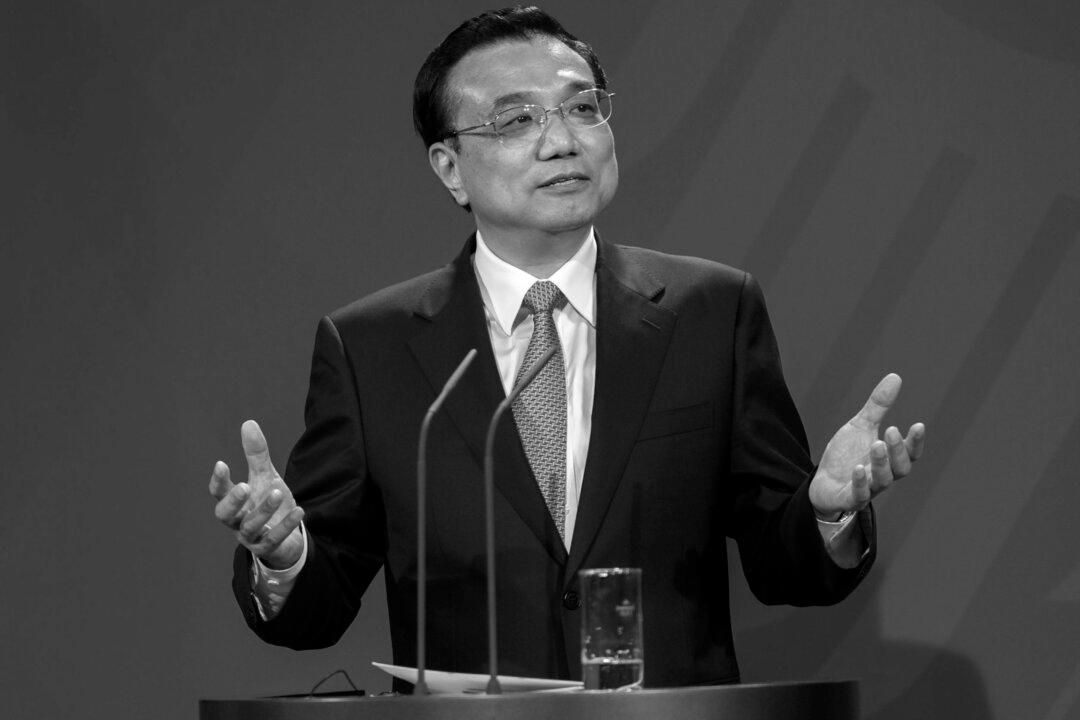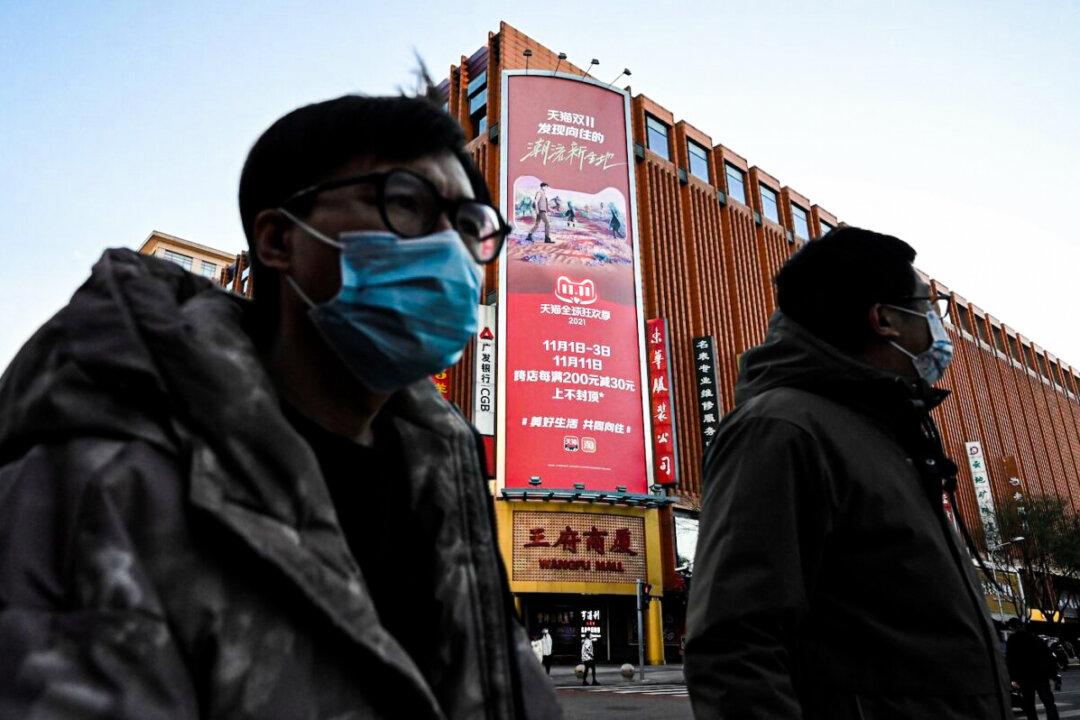In today’s China, where economic bubbles and concept bubbles go hand in hand, a concept can die faster than it takes to verify its feasibility. This is precisely the fate of “Likonomics,” a concept coined at the end of June by Barclays Capital to describe a series of measures set forth by Premier Li Keqiang and optimistically extolled by the international investment-banking sector.
The two main parts of Likonomics, deleveraging and “no stimulus,” fell apart as soon as the Chinese regime’s investment horn sounded. As for the third part, structural reform, which had a slow start to begin with, it can only head down the old road, following the regime’s new stimulus.
Local Projects
No sooner had Chinese Minister of Finance Lou Jiwei spoken the words “no stimulus” at the G20 finance ministers’ meeting than many provinces and cities, including Jiangsu, Anhui, Chongqing, Sichuan, Guizhou, and Shaanxi, had already issued documents, deployed, or held meetings requiring lower-level governments to speed up their railway, highway, and airport construction projects under the Twelfth Five-Year Plan.
Since 1953, the Chinese regime has been using five-year periods for its short-term economic plans. The Twelfth Five-Year Plan covers the years 2011–2015. Part of this plan calls for rapid infrastructure expansion of railways, highways, and airports.
Approximately 36 city development and reform departments have approved applications for urban-transport construction projects. Infrastructure expansion and renewal of slum areas have become the focal points of a new round of local government investments.
However, with the premier and the minister of finance having both stated that there would be no new stimulus, would local governments dare to defy the central authorities and go their own ways?
Those who know the Chinese Communist Party’s operation know that this can only be regarded as an act of self-delusion. For even though it appears that the local governments are running their own houses by approving projects at will, when it comes to the real implementation phase of these projects, they will need to be given “policies” from the central authorities, or else they will be unable to do anything.
Central Leadership: ‘Financial Support’
While the international investment-banking sector was cheering that deleveraging would bring about China’s financial reform toward marketization, the Chinese regime decided to let banks provide massive support to local governments.
In July, the State Council issued its “Promulgation of Guiding Opinions on Financial Support for Economic Restructuring, Transformation, and Upgrades,” which ordered continued financial support for “key areas” and “weak links.”
And on Aug. 12, the State Council issued the directive “State Council on Financial Support of the Implementation of Small and Micro Enterprise Development Advice,” which stated that financial services and policy support for small and micro enterprises should be increased.
Shanghai is the focus of this financial-policy support. On Aug. 6, the Agricultural Bank of China (ABC) signed an agreement with the Shanghai Municipal Government to provide a 250 billion yuan (USD$41 billion) loan to Shanghai. This amount is equivalent to 12.5 percent of Shanghai’s GDP last year. The loan will be used to support the construction of Disneyland in Shanghai, as well as an urban renewal project involving Shanghai’s Free Trade Zone.
According to the Daily Economic News, this new loan is only one of six financial support components that ABC will give to Shanghai. Such a large loan amount suggests that the government will carry out “a new round of fiscal stimulus,” it said.
In addition to major commercial banks, China Development Bank (CDB), which serves the interests of national policies, also joined up this time. Recently, CDB signed cooperation memorandums with the Jiangsu, Hebei, and Qinghai provincial governments to support them. Meanwhile, the provincial branches of CDB also signed many prefecture-level agreements with local governments.
CDB chairman Hu Huaibang, in a recent interview, said that CDB has issued hundreds of billions of RMB in new loans in the first half of this year, more than 80 percent of which were used for the industries of coal, electricity, transportation, agriculture, forestry, water, communications, and public infrastructure.
The CDB’s participation implies that issuing local bonds will become the main source of funding. As we all know, CDB is a bond bank, mainly raising capital by issuing debts. It is second only to the Ministry of Finance in issuing bonds and is commonly known as “the second Ministry of Finance.”
When a commercial bank increases loans to local governments, it follows that this is considered an act of stimulating commercial activity, but when the CDB issues loans to local governments, it constitutes a financial economic stimulus.
Local Debt
The vast majority of domestic and international economic experts believe that China’s huge government debt and the shadow banking system are the two major factors likely to trigger an economic and financial crisis. China’s state economists also have worried about this problem.
In July, the fiscal transparency report published by Tsinghua University showed that the overall transparency of China’s 289 cities was disappointingly low, with even the highest-ranking city of Shanghai still failing to meet the basic requirements. More seriously, a lot of local governments concealed their debts. Only 13 cities opened up their debt information to the public.
Local governments’ debts have long been a mess. Not only are the old debts not being repaid, but also a large amount of new debts are still being generated, something rarely seen in democratic countries.
In the United States, such local governments can only declare bankruptcy, as happened in Orange County in Southern California in 1994 and recently in the city of Detroit.
According to an old communist adage, “Nothing can defeat the Chinese Communist Party.” And that’s because there is no accountability or credibility to begin with.
An Aug. 13, Outlook Newsweek investigative report found that local officials simply don’t repay the debts borrowed by their predecessors in office.
With a fixed income from taxes, provincial governments’ expenses keep going up. Their understanding of urbanization is as simple as increasing investment in infrastructure, so it’s no wonder that debts keep on increasing year by year, the report found.
But the biggest problem is not the debt growth, but the debt opaqueness, the report said. The local governments couldn’t figure out how much debt they owed. Local city, county, and township leaders not only have no debt consciousness, but there also exists a dishonest mentality of deferring the debt. They think they have no obligation to repay debt owed by the previous round of officials.
This kind of economics has no credibility at all. In an economic structure without credibility, investment and production all become acts to satisfy short-term needs.
Thus, one comes to the conclusion that the long-awaited Likonomics reform will continue the policy of stimulating economic development through government investment, which was established by former Premier Wen Jiabao in 2008.
This so-called economic reform is nothing but the same old thing with a new label on it. It uses the new banner of investing in a “new kind of urbanization” instead of the “property market,” while also giving farmers who move to cities “hukou” residency status.
This certainly isn’t Li Keqiang’s fault. In an earlier article, I pointed out that Likonomics lacks the institutional basis for implementation. When facing pressure from all sides, over a period of time, it will quietly change course. The only thing I didn’t anticipate was that the period of time would be less than three months.
He Qinglian is a prominent Chinese author and economist. Currently based in the United States, she authored “China’s Pitfalls,” which concerns corruption in China’s economic reform of the 1990s, and “The Fog of Censorship: Media Control in China,” which addresses the manipulation and restriction of the press. This article is an abridged version of a longer article first published on the VOA Chinese website.





